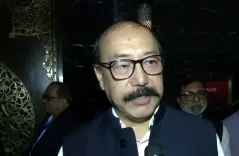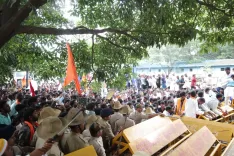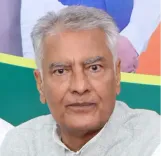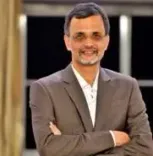Jitendra Singh: Gujarat Governance Model as a Replicable Success
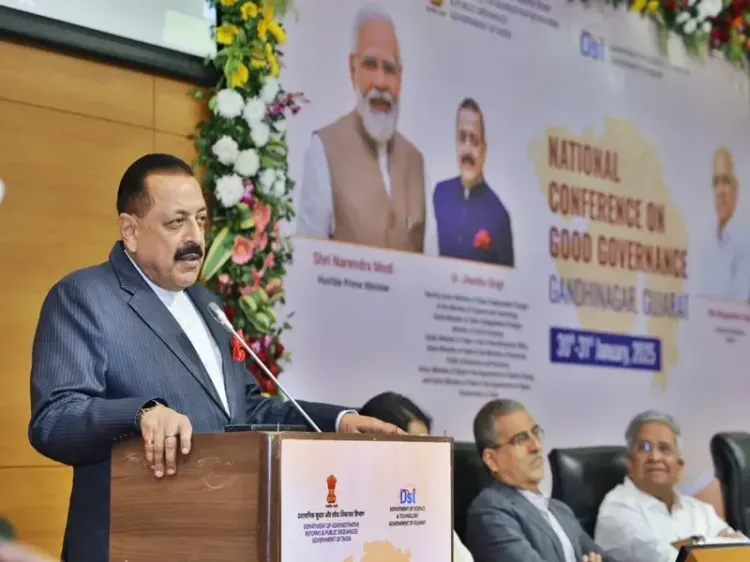
Synopsis
Key Takeaways
- Gujarat Governance Model provides replicable practices.
- Decentralization of governance is essential for effective policymaking.
- Technological advancements are crucial for future governance.
- Grievance redressal systems have improved citizen engagement.
- India is on a path toward becoming a global governance model.
Gandhinagar, Jan 30 (NationPress) Union Minister Jitendra Singh stated on Thursday that the "Gujarat Governance Model" presents numerous best practices that can be effectively replicated in other regions as well.
While addressing the National Conference on Good Governance, the minister noted that many governance innovations that are now successfully implemented at the national level were initially introduced in Gujarat during Prime Minister Narendra Modi's tenure as Chief Minister.
Speaking to an audience of policymakers, senior bureaucrats, and governance specialists from across the country, Jitendra Singh commended the significant changes in governance over the past decade.
"This change did not occur suddenly. Several reforms that we now see on a national scale were first tested and refined in Gujarat, and they are now being adopted nationwide," he remarked.
Jitendra Singh emphasized the fundamental transformation in governance culture under Prime Minister Modi, which has expanded policymaking beyond the traditional corridors of power in Delhi to various regions across the country.
He cited the Prime Minister's instruction to decentralize governance, ensuring that significant policy discussions, conferences, and outreach programs occur in different areas and not solely in Delhi.
He also mentioned the evolution of India’s administrative structure, reflecting on how Sardar Patel envisioned a strong bureaucracy as the 'steel frame' of India, a vision that has been further developed through the PM Modi-led government’s approach of 'Maximum Governance, Minimum Government.'
He highlighted landmark reforms such as the elimination of nearly 2,000 outdated laws, the abolishment of requirements for attested documents, and the discontinuation of interviews for junior-level government positions, all aimed at simplifying bureaucracy and improving transparency.
One of the notable innovations in governance, Jitendra Singh pointed out, was Gujarat's early adoption of the 24-hour rural electrification initiative in the early 2000s.
"During a period when electricity supply was inconsistent throughout the nation, Gujarat led the way in providing uninterrupted rural electrification, a model that was later expanded nationally," he stated.
Reflecting on the extent of transformation, Jitendra Singh spoke about how power shortages were once a common issue in many regions of India.
"There was a time when people would applaud when the lights returned after an outage. Today, power cuts are unusual, and consistent electricity is an expectation, not a luxury. This illustrates the scale of governance transformation achieved," he remarked.
The Minister also discussed India's advancements in digital governance, stressing the importance of major technological initiatives in public administration.
Projects like online RTI applications, digital life certificates for pensioners utilizing facial recognition technology, and AI-driven administrative decision-making have established India as a frontrunner in governance innovation.
He asserted that the integration of emerging technologies will be pivotal to governance in the coming years, enhancing administration efficacy, transparency, and citizen engagement.
Dr. Jitendra Singh also mentioned the remarkable progress in grievance redressal mechanisms, particularly the CPGRAMS (Centralized Public Grievance Redressal and Monitoring System), which has now become a blueprint for citizen-centered governance internationally.
The minister highlighted that between 2019 and 2024, India experienced a transformative governance shift, with e-governance facilitating better citizen-government interactions and promoting transparency.
He remarked that the widespread use of e-Office version 7.0 has enabled a paperless administration across Ministries, ensuring greater efficiency and accountability in governance.
He underscored India's dedication to e-governance as further evidenced by platforms like the National Conference on e-Governance (NCeG), which has promoted collaboration between the Centre and States since 1997.
Jitendra Singh highlighted the successful completion of the fourth Sushasan Saptah - Good Governance Week - held from December 19 to 25, 2024, with over 36,000 camps organized across more than 700 districts, resolving nearly 2.89 crore service applications. This campaign showcased the government's commitment to transparency, accountability, and citizen empowerment at all levels.
Dr. Jitendra Singh expressed optimism that ongoing collaboration between Central and state governments would lead to more significant reforms, ultimately steering India towards becoming a global benchmark for effective governance.

